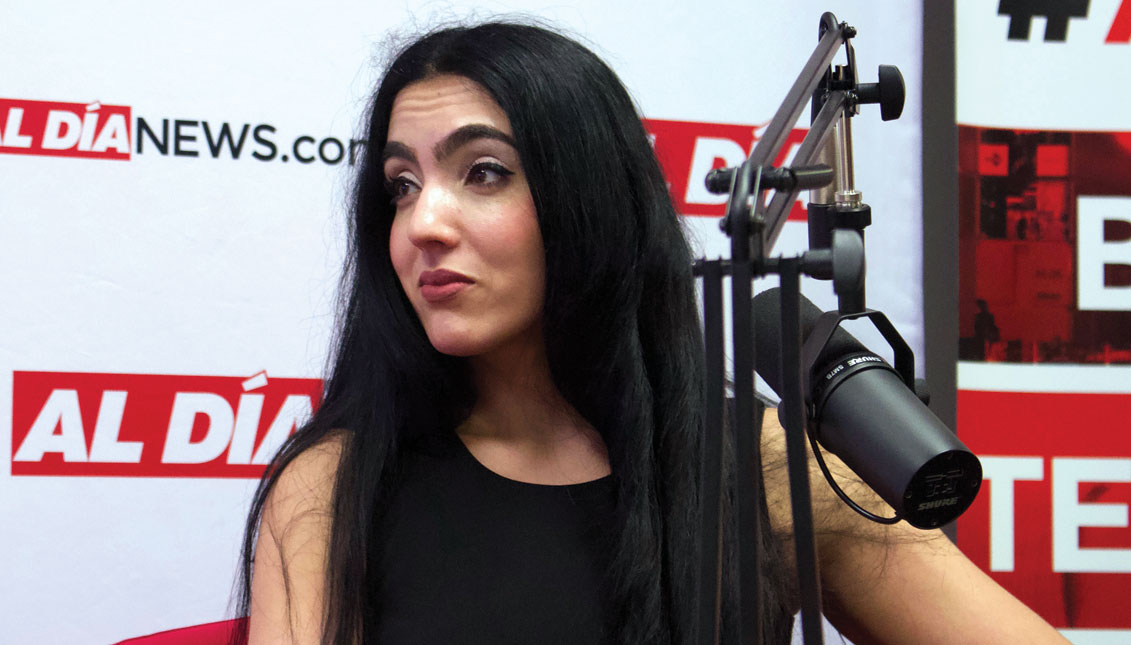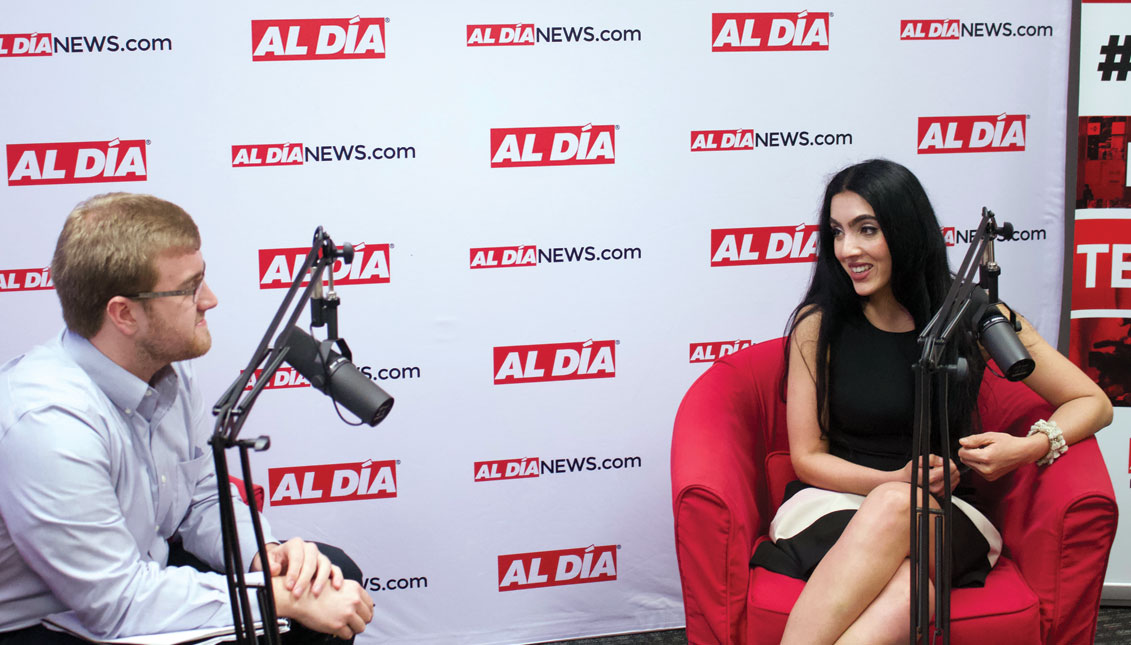
Gisele Fetterman speaks softly but powerfully from her new platform as Second Lady of Pennsylvania
On Mar. 25, Gisele Fetterman visited AL DÍA Newsroom to discuss her journey to becoming Second Lady of Pennsylvania, and her plans for using her new platform…
It’s mid-February and the new Second Lady of PA, Gisele Fetterman is back home in Braddock, PA.
She’s spending the day at the flagship location of her Free Store, directing those in need to available goods and serving them food. Fetterman founded the Free Store in 2012, when her husband, John Fetterman, was mayor of the old steel town about nine miles from Pittsburgh. Since opening the first one, 12 other Free Store locations have opened across the state. Through donations, these stores provide free essentials for those in need, including diapers, baby formula, clothing, food and more.
That day in Braddock, an older man came in for food. He was very open with how he felt about immigration.
“He told me that immigrants shouldn’t be here,” said Fetterman.
It’s something she’s gotten used to since becoming a public figure.
Fetterman is a former undocumented immigrant from Brazil. She came to the U.S. at seven years old, arriving in Queens, New York City, before settling in Hamilton, New Jersey. Her mother held a Ph.D. in Brazil, but upon immigrating to the U.S., took up many service jobs so her children could achieve the coveted American dream.
“I’m really proud of that story. I’m really grateful my mom was courageous to do that.” said Fetterman on a recent visit to AL DÍA on Mar. 25. “If I don’t tell that story, I’m doing a dishonor to the sacrifices she has made.”
Her story is one she’s shared many times since entering the limelight with her husband, and something she’s used to connect with immigrants and American citizens alike.
The older man with anti-immigrant sentiments was no different.
“I wanted to know where that came from,” said Fetterman. “If I’m willing to listen, if he’s willing to share, then we can get somewhere.”
And get somewhere they did.
The man was a veteran who returned home and struggled to find work. He blamed his troubles on immigrants, informed by a media cycle and president that paints them as constant threats to the country’s well being. After Fetterman listened to his side and shared her story with him, the man apologized and the two hugged it out.
Fetterman understands all too well that not every conflict of a similar nature ends on good terms, but it’s the willingness to participate in discussion that gives greater understanding and reconciliation a chance.
“If I wasn’t willing to have that conversation then we never would have gotten to that place,” she said.
It’s a story and approach that often escapes the mainstream media and political debates of today.

The common ground found is not as members of a party or ideology, but as human beings. Rather than try to one up or disregard the old man’s diatribe, Fetterman listened. In seeing that, the man listened too, planting seeds of connection that are often difficult to cultivate, especially when discussing polarizing issues like immigration.
Fetterman’s approach is one she has put into practice throughout her time as a public figure. Using her own story as inspiration, she opened a dialogue with the struggling town of Braddock and created what her husband cited as his most impactful initiative in the Free Store.
As Second Lady of PA, Fetterman said that her approach of building dialogue and bridges will not change.
“I think our model continues. The people have to be a part of the conversation. It’s never entering a room with a lot of answers. It’s entering a room and doing a lot of listening,” she said.
One of her plans is to keep growing initiatives she started in Braddock, like the Free Store and 412 Food Rescue. Combined, both organizations have salvaged close to 5 million pounds of food for those in need across Pennsylvania.
“That has fed all sorts of bellies, not just immigrant bellies. Many, many, mostly American bellies,” said Fetterman.
Outside of her own organizations, Fetterman also plans to take on criminal justice reform in Pennsylvania.
Despite a declining prison population over the past couple of years, PA still holds one of the largest populations in the country on probation, which could contribute to whether that decrease continues. It’s an issue Fetterman has always had a passion for.
“Since I was 11, my dream was to be a warden in a men’s prison. It’s in my middle school yearbook,” she said.
RELATED CONTENT

Soon, Fetterman will kick off a warden-for-a-day tour, where she will visit every prison in the state to gauge their conditions and collaborate on solutions with incarcerated inmates and prison employees.
Fetterman also hopes to put human faces on the statistics that all too often represent PA’s prison population, in the same way that sharing her own story allowed her to give a personal voice to the image of immigrants many people have.
“How can we humanize people more? How can we bring light to spaces? How can we find solutions to do things a little better?” she said.
In her new position alongside her husband, her voice and story can now go beyond the state and enter the national conversation.
Fetterman will be the first to tell you she’s not a politician because “politics is mean and I am not.”

But whether she likes it or not, she has already proven that her voice, founded on her own story, has the power to enter the conversation and make an impact.
That impact through dialogue also has the potential to change how society looks at leaders.
When compared to other women leaders in politics, like Alexandria Ocasio-Cortez and Ilhan Omar, Fetterman praised their toughness, but noted that they embody a different kind of strength than the one that she most often taps into for her work.
“I’m a much softer approach. In this world that’s really hard and really tough, is there room for team soft?,” she said.
“We have a place in there, too.”
Fetterman’s strength is found in the vulnerability of her previous status as an undocumented immigrant, and is a quality, as she described, which makes her a good listener and able to reach individuals a tough approach would never crack. In a society that associates political action with the loudest voices, and what are perceived to be stereotypically masculine and tough approaches, a soft approach may be just what we need.
“It’s ok if your voice shakes and your voice isn’t the loudest because mine will never be the loudest,” said Fetterman.
“But I’m still going to continue to tell those stories.”











LEAVE A COMMENT: